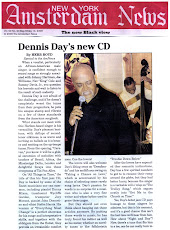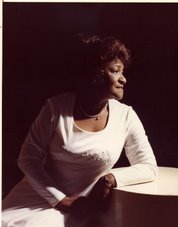Thursday, May 20, 2010
Win-Win Situation for Fisk Jubilees and Carnegie Hall’s Community Sing
©D-Day Media Group, Inc.
“In the Fisk Jubilee Singers, America has produced the perfectest flower of the ages. I wish it were a foreign product, so that she (America) could lavish money on them and go properly crazy over them.”
- Mark Twain, American Humorist
The Community Sing with the Fisk Jubilee Singers from Nashville, Tennessee, sponsored by Carnegie Hall and held at Aarron Davis Hall on the pristine campus of City College, was a resounding success Tuesday evening, May 18. Despite a grey drizzly evening, a large, racially diverse audience turned out to hear the renowned Jubilee Singers and was charmed by 17 bright-eyed African-American singer-scholars. The Fisk Jubilee Singers, , a group Mark Twain once associated with a choir of angels, carry on a rich American tradition of more than 140 years, singing “slave songs,” known today as spirituals. The original Jubilee Singers introduced these beautiful songs to the world in 1871 and were instrumental in spreading and preserving this rich American musical tradition. In the late 19th century, they broke racial barriers in the U.S. and abroad, even performing before Europe’s royalty.
If audience response is any indication of what the future portends for Fisk University and its storied Jubilee Singers’ hallowed tradition, this week’s performance supplied ample assurance that the historically Black university’s prospect for once again becoming a premier destination among the best and brightest students is not a pipe dream. Vastly expanded opportunities for African Americans during in the post-Civil Rights Movement era coupled with some progress in enforcing equal educational opportunity and affirmative action policies pose ongoing competitive challenges for the private, once-elite baccalaureate-level university as it seeks to attract gifted faculty and students. In recent years Fisk has been plagued with dwindling enrollment and allegations of financial mis-management. A lawsuit enjoining the University not to sell highly valued pieces of its vaunted Alfred Stieglitz art collection – bequeathed by Georgia O’Keefe – in an effort to remain solvent has wound its way through the Tennessee Supreme Court.
Despite these challenges, Fisk remains a beacon of hope for today’s generation of mostly young African Americans seeking a solid liberal arts education from an institution that once held the distinction of producing more Black PhDs in natural science than any other American university. In fact, until the mid 20th century nearly half of all African-American physicians and dentists were graduates of Fisk. An unpublished survey conducted by D-Day Media Group in 2007 found that Fisk graduates have served for more cumulative years in governmental leadership and legislative positions, both elected and appointed, than graduates from any other school except Harvard, Yale, Howard, and Princeton.
The nation’s first African-American Solicitor General, Wade McCree, was a Fisk alumnus and the late Judge Constance Baker Motely matriculated at Fisk and served as U.S Federal District Court Magistrate from 1982 to 2005. From 1942 until his retirement in 1970, U.S. Congressman William Dawson (D) of Chicago was a powerful chairman of several committees. Congressman and leading Civil Rights figure John Lewis (D) of Georgia has represented that state’s Fifth Congressional District since 1987, while Alcee L.Hastings (D) has served Florida’s 23rd District. Fisk’s current president, the honorable Hazel O’Leary, Esq. served as Secretary of the Environmental Protection Agency under former president Bill Clinton. And Clinton’s chairperson of the One America Initiative on Race was the late historian Dr. John Hope Franklin, former Professor Emeritus at Duke University and one of Fisk’s most notable alumni. Together, these leaders’ extensive terms total well over 100 years of national service.
The Fisk roster of illustrious alumni and professors is impressive by any academic measure. The list includes Dr. W.E.B Du Bois, regarded by many as one of the 20th century’s leading intellectuals and social philosophers, and Dr. Charles S. Johnson, an African-American social scientist largely credited with having helped advance research on African Americans and the modern school of social science methodology. Johnson also became president of Fisk. Other notable teachers were Japanese-American sociologist Dr. J. Masuoka, and four powerful influences of the Harlem Renaissance: Writer and poet Arna Bontemps; James Weldon Johnson, who served as Adam K. Spence Chair of Creative Writing; Arthur Schomberg, Curator of Black Literature; and artist Aaron Douglass. Contemporary notable figures who share the Fisk experience include Judith Jamison, director of the Alvin Ailey Dance Company; renowned poet Nikki Giovanni, and the Pulitzer Prize-winning author-historian alumnus Daniel Levering Lewis.
Historically Black Colleges and Universities (HBCUs) have made immense contributions to our nation’s welfare and deserve wide recognition. Fisk University stands at the vanguard of those great institutions. If Fisk is to thrive, administrators, trustees, faculty, students, and alumni must summon their best angels and wisely employ all necessary human and capitol resources needed to sustain Fisk’s academic reputation and status as a top-tier liberal arts postsecondary institution.
The Carnegie Hall/Fisk Jubilee Communiy Sing template is simple and powerful. Director Paul Kwame provides the audience with a brief historical outline of the University’s origins during the U.S. period of Reconstruction and shares vignettes about Fisk’s struggle to independently establish the first permanent edifice erected for the education of Blacks in the South – Jubilee Hall, now a national historic landmark. He then rehearses each choral section; soprano, alto, tenor, and bass. After a couple of trial run-throughs, the Jubilee Singers perform a version of the song being taught to the audience. The audience has now been gracefully molded into a newly minted chorus and is cued by Director Kwami to sing along with the legendary Singers. The effect is a profound communal experience that is at once powerful, inclusive, self-affirming, and educational – a beautiful mosaic of ethnic and cultural diversity.
Fisk and Carnegie Hall, or some other viable business, partner should consider expanding this concept nationwide. The Carnegie Hall/Fisk Jubilee Community Sing Partnership offers an important forum for reconnecting Fisk’s remarkable narrative to ordinary Americans in cities, villages, and hamlets throughout the nation. By introducing entire communities of contemporary Americans to a slice of authentic American culture as introduced, performed, and perfected by people of African descent, these mini audience-participation concerts would afford students and families an invaluable opportunity for lessons about cultural history that become exercises in democracy, requiring common goals, leadership, cooperation, participation, and execution. The experience is a rare and precious one, unlike any other.
With diminished support for the arts, both Fisk and a partnering arts organization could generate needed revenue from the sale of DVDs, CDs, and related paraphalia. The biggest most enduring sale being one’s bragging rights when captured on video, documenting that “I once sang with the Fisk Jubilee Singers!”
Thursday, May 13, 2010
Refections on Stevie Wonder: the Age of Innocence
My sister, a talented singer in her own right, along with her Our Gang-motley crew from the "hood" would tag along wherever Little Stevie and his escorts would roam, like good little groupies savoring his spontaneous bursts into song, coaxing the “Boy Wonder” to sing and play his harmonica. More often than not those assisting him, usually his cousins, former baby sitters, or neighbors would allow this extraordinarily gifted child freedom to dazzle his young and older admirers with a selection or two.
In our neighborhood, we all knew the little blind Morris grandchild visiting from near Detroit was special. Stevie’s impromptu mini-concerts usually took place near his grandparents’ home and family business, the Morris Liquor Store at 138th and Alexander Avenue, or on the bustling green and playground of Smith Park that served as a sort of Village Square near the Carver Public Swimming Pool. This phase of Stevie’s emergence as an artist predates his rise to fame with his first huge hit record Fingertips, Part 1.
When Stevie visited the “hood” back in the day, it was like watching the Pied Piper, only in real time. Instead of leading rats to the river, boys and girls trailed Little Stevie during the humid hazy days of Lake Michigan summers, marveling at his talent, waiving in the musical afterglow of pure soulful genius. The boy Wonder’s entourage often lingered for one last song into the evening, before the street lights came on and happy kids from a more innocent time excitedly returned home, sharing the story of their unforgettable musical experience that day.
I was privileged to have been part of Stevie’s marches in Washington DC, during his successful campaign to make Dr. Martin Luther King’s birthday a national holiday. If our paths should cross again, I’d ask him whether his mom or grandparents allowed him to go swimming in the neighborhood public swimming pool located a block from his grandparents’ home and business. The pool opened its doors in the 1940s, named in honor of George Washington Carver the great African- American scientist, who personally attended the ribbon cutting ceremony. The Carver Swimming Pool was built to preserve racially segregated neighborhoods and recreational activities in East Chicago, a town known as a melting pot of ethnic backgrounds. For nearly 70 years, Carver Pool was a source of community pride and summer joy and for generations of largely black and Puerta Rican youth. The swimming pool has long since been demolished and the rust belt neighborhood Stevie and I fondly recall is nearly a ghost town as a result of the region’s decline as a steel-producing economic engine. What will never fade are our sweet memories of youth and the joy one little blind kid shared annually with those of us “living in the city.” Happy 60th birthday Stevie, we love you!











